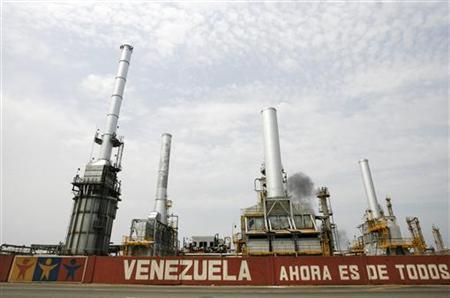Venezuela, the country home to the world’s largest oil reserves, will have to switch-off production. The reason? If oil falls further, it will become unprofitable to produce
In January, Venezuela pumped 2.7 million barrels of oil per day, but that number could soon be 0.
The breaking point could come if Venezuela starts losing money on oil production.
Venezuelan crude is priced lower than WTI and Brent, because it is very heavy and requires additional refining before it can be sold as a finished product. The average price in 2016 for Venezuela’s mix of heavy and medium crude is $24.46 in 2016 so far, according to government officials.
In the week that ended February 5, the price was $25.27, up from the previous week’s $24.16.
The cost of producing a barrel of oil is about $20, according to independent sources, but state-run oil monopoly Petroleos de Venezuela S.A. (PDVSA) insists it is lower at $10.
Oil is essential to the survival of Venezuela’s economy, as 96 percent of the government’s budget is dependent on the natural resource.
A resource that it has a lot of it: Venezuela boasts the world’s largest proven reserves with 298 billion barrels of oil but is only the world’s 12th largest producer.
The energy industry has long been in disarray. The country is only producing about half the 5 million barrels of oil per day that the Hugo Chavez, who ruled the country from 1999 until his death in 2013, promised to achieve.
In 2006, Chavez made an executive order to nationalize the country’s oil exploration and production, and 16 firms were taken over by the state. The country enjoyed record-high oil prices from 2008 until 2014, but when prices began to drop, Caracas was unprepared.
Problems range from a lack of investment and development of foreign investors to tap into the country’s vast resources, such as the Orinoco Petroleum Belt, which one of the biggest proven oil reserves in the world. However, the oil deposits are thick and tar-like and require sophisticated technology to extract.
Future development projects have taken a side seat as the government scrambles to simply provide enough energy resources for its own population.
For the first time in the country’s 100-year oil production history, Venezuela purchased gasoline and other fuel products from the US just to meet domestic demand. This was only made possible by America’s recent lift of the ban to export crude products.
Just a few years ago, it was an entirely different story. Venezuela was sending a large share of its petroleum products to the US, and the massive amount of foreign currency flowing in helped prop up the economy. In July of 2008, Venezuela’s blend was fetching $126 in oil markets.
Oil prices are of course not the only factor bringing Venezuela on the brink of default. The economy has been in a state of disarray for years under President Nicholas Maduro. Basic necessities such as diapers are nowhere to be found on store shelves, and the currency is actually worth less than a paper napkin but the government keeps printing more.
The IMF forecasts inflation could reach 720%. An opposition party swept the country’s parliament elections in December, but if they can’t prove themselves capable of dealing with the country’s shortages and inflation, the political situation will become dire. The Zika virus, which recently claimed its first three victims in Venezuela, could intensify the struggle.
The country has $123 billion in external debt and is scheduled to make $16 billion in debt payments. Venezuela’s reserves, which are mostly held in gold, total about $15 billion. The next $1.5 billion external bond repayment is due on February 26.
To keep the lights on, Caracas has been seeking emergency lending from China, as well as new oil ventures in Nigeria.
Louise Dickson

